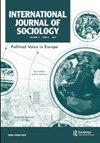How Educational, Economic, and Cultural Resources Do Matter: Cohort Differences in the Impact of Parental Resources on Educational Attainment in the Socialist and Post-Socialist Contexts
IF 1.8
Q2 SOCIOLOGY
引用次数: 4
Abstract
Abstract The paper concentrates on the ways the interplay of parental economic, educational, and cultural resources in the intergenerational transmission of educational attainment has changed due to the marketization of post-socialist societies and educational systems. We combine two different approaches: a variable-based regression analysis and a case-based qualitative comparative analysis (QCA). The analysis is based on the European Union Statistics on Income and Living Conditions (EU-SILC) 2011 and concentrates on Estonia. The results indicate that parental educational and cultural resources, manifested in a large home library, enhance children’s attainment of higher education. It does so not only in post-socialist Estonia but also during the socialist period despite the Soviet educational system being designed explicitly to eliminate social privilege. Comparison of cohorts who attained higher education during the mid-socialist, late-socialist, and post-socialist periods shows that for all of them common combination with high level of all considered parental resources is highly effective in securing attainment of higher education. In addition to that common effective combination of parental resources, each cohort has its own particular combination of parental resources that effectively enabled attainment of higher education. The influence of the resources that the family deploys tends to accumulate instead of being a compensation channel that conveys parental influence on education. Regression analysis and QCA are complementary: The former allows assessment of the net impact of each individual parental resource on attainment of higher education. The latter reveals the differential impact of individual resources depending of their configurations.教育、经济和文化资源如何起作用:社会主义和后社会主义背景下父母资源对教育成就影响的队列差异
摘要本文主要研究后社会主义社会和教育体制的市场化进程中,父母的经济、教育和文化资源在教育成就代际传递中的相互作用方式发生了变化。我们结合了两种不同的方法:基于变量的回归分析和基于案例的定性比较分析(QCA)。该分析以2011年欧盟收入和生活条件统计数据(EU-SILC)为基础,重点关注爱沙尼亚。结果表明,以大型家庭图书馆为代表的父母教育文化资源对子女接受高等教育有促进作用。它不仅在后社会主义爱沙尼亚这样做,而且在社会主义时期也这样做,尽管苏联教育制度的设计明确是为了消除社会特权。对在社会主义中期、社会主义晚期和后社会主义时期接受高等教育的人群的比较表明,对所有这些人来说,与高水平的所有被认为是父母资源的共同组合在确保获得高等教育方面是非常有效的。除了父母资源的共同有效组合之外,每个群体都有自己独特的父母资源组合,这些资源有效地使他们能够获得高等教育。家庭资源的影响倾向于积累,而不是作为一种补偿渠道来传达父母对教育的影响。回归分析和质量分析是互补的:前者允许评估每个单独的父母资源对获得高等教育的净影响。后者揭示了不同配置的单个资源的不同影响。
本文章由计算机程序翻译,如有差异,请以英文原文为准。
求助全文
约1分钟内获得全文
求助全文

 求助内容:
求助内容: 应助结果提醒方式:
应助结果提醒方式:


